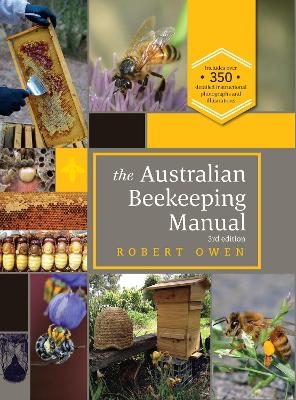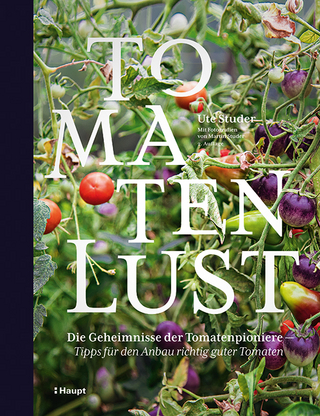
The Australian Beekeeping Manual
Exisle Publishing (Verlag)
978-1-922539-79-3 (ISBN)
- Titel z.Zt. nicht lieferbar
- Versandkostenfrei innerhalb Deutschlands
- Auch auf Rechnung
- Verfügbarkeit in der Filiale vor Ort prüfen
- Artikel merken
Now in its 3rd edition, The Australian Beekeeping Manual is the most comprehensive reference for both novice and experienced beekeepers in Australia.
The accessible yet detailed text, supported by over 350 full-colour photographs and illustrations, covers all the key areas, including the beekeeping equipment needed, how to obtain bees, where to locate them in the garden, and the basics of colony management. There are also in-depth chapters on the lifecycle of the honey bee, extracting honey, creating a bee-friendly garden, entering honey in competitions, pests and diseases, native bees, and rearing queens.
The result is an invaluable beekeeping resource that will be referred to time and again, and which can be taken out to the hive for use as an immediate step-by-step guide or read at leisure.
Dr Robert Owen was introduced to the world of beekeeping in 2002 and for many years was the owner of a specialist business providing education and supplies to Australian beekeepers. Through his business, Robert met and talked with hundreds of hobby and professional beekeepers. Subsequently, Robert has completed his PhD in honey bee diseases at the University of Melbourne. For the last few years, he has worked as a volunteer with an aid agency teaching beekeeping, queen rearing, and honey processing in Lebanon, Nigeria, Benin, Bangladesh and Nepal. Robert currently lives in Bangkok, Thailand.
Introduction viii
Chapter 1 Life history of the honey bee 4
- Castes of the honey bee 4
- The Western honey bee and its subspecies 6
- Lifecycle of the honey bee 8
- Mating and drone congregation areas 15
- Life as a young adult bee 16
- Collecting nectar and pollen 19
- Communications and navigation 20
- Honey bees as superorganisms 24
Chapter 2 Basic equipment and protective clothing 28
- Equipment 28
- Protective clothing 36
Chapter 3 Constructing hives 46
- Constructing a hive 46
- Other parts of a hive 63
Chapter 4 Frames and how to build them 66
- Frames 66
- Cleaning used frames 71
- Attaching foundation to the frame 71
- Using wax or plastic foundation 74
- Using plastic sides for frames 74
Chapter 5 Your first bees 76
- Obtaining your first bees 77
- What kind of bees should I keep? 78
- Should I buy an established hive or catch a swarm? 79
- Swarms and swarm catching 80
- Transferring an established colony 84
- Moving hives 88
- General maintenance and inspections during the first year 91
Chapter 6 Locating your bees 98
- Locating hives on your property 98
- Hive position in summer and winter 102
- Urban beekeeping 102
- Feeding bees water 105
Chapter 7 Spring and summer management 108
- Inspections 111
- Managing the build-up of bees in your hive to maximise
honey production 117
- Managing the honey flow 118
- Merging colonies 119
- Feeding syrup 120
- Sugar candy 123
- Feeding pollen or pollen substitute 123
- Swarms 124
- Providing hives for pollination 128
- Collecting pollen 131
Chapter 8 Autumn and winter management 132
- Autumn 132
- The winter shutdown 135
- Winter 141
Chapter 9 Extracting 144
- Using a sieve to harvest honey 144
- Use of an extractor to harvest honey 146
- Choosing an extractor 150
- Type of extractor to buy 153
- Comb honey 155
- Reuse of wax foundation 156
- Colour of wax 160
Chapter 10 Preparing honey for sale and competitions 162
- Preparing honey for sale 162
- Preparing honey for competitions 165
Chapter 11 Rearing queens 178
- The three reasons for a colony to produce a new queen 180
- Hive splitting 181
- Queen candy 187
Chapter 12 Sustainable beekeeping 188
- Natural beekeeping hives 193
Chapter 13 The bee-friendly garden 204
- Bee-friendly flowering plants 204
- Further considerations for the bee-friendly garden 215
- A garden is a work in progress 223
Chapter 14 Native bees 228
- Social bees 228
- Solitary bees 234
Chapter 15 Diseases of the honey bee 248
- Diseases of brood 248
- Good management practices to minimise disease in the colony 249
- American Foul Brood (AFB) 249
- European Foul Brood (EFB) 253
- Sacbrood virus (SBV) 255
- Chalkbrood 256
- Adult bee diseases 258
Chapter 16 Parasites of the honey bee 262
- Varroa 262
- Tropilaelaps mites — the Asian mite 270
Chapter 17 Pests of the honey bee 274
- Wax Moth 274
- Small Hive Beetle (SHB) 277
- Braula fly 285
Chapter 18 Other problems of the honey bee 288
- Pesticide and fungicide poisoning 288
- Chilled brood 290
- Overheating of the hive 291
- Damp hives 292
- Cane toads 293
- Ants 294
- Mice 295
- Colony Collapse Disorder (CCD) 296
Chapter 19 Other types of bees and wasps 300
- The Asian honey bee (Apis cerana) 300
- Bumblebees 305
- Wasps 309
- Asian hornets 314
- Other races of Apis mellifera 315
- Other species of Asian bees 317
Chapter 20 Flow Hive 320
- Introduction 320
- Flow design 321
- Setting up a Flow Hive 327
- Extracting 328
- Tips when keeping bees 331
- Disadvantages of a Flow Hive 335
Appendix: Sizes of frames and boxes 336
Glossary 341
Acknowledgements and picture credits 349
Bibliography 352
Index
| Erscheinungsdatum | 04.08.2023 |
|---|---|
| Zusatzinfo | Illustrations, color |
| Verlagsort | Woolombi |
| Sprache | englisch |
| Maße | 184 x 242 mm |
| Themenwelt | Sachbuch/Ratgeber ► Natur / Technik ► Garten |
| Weitere Fachgebiete ► Land- / Forstwirtschaft / Fischerei | |
| ISBN-10 | 1-922539-79-1 / 1922539791 |
| ISBN-13 | 978-1-922539-79-3 / 9781922539793 |
| Zustand | Neuware |
| Informationen gemäß Produktsicherheitsverordnung (GPSR) | |
| Haben Sie eine Frage zum Produkt? |
aus dem Bereich


